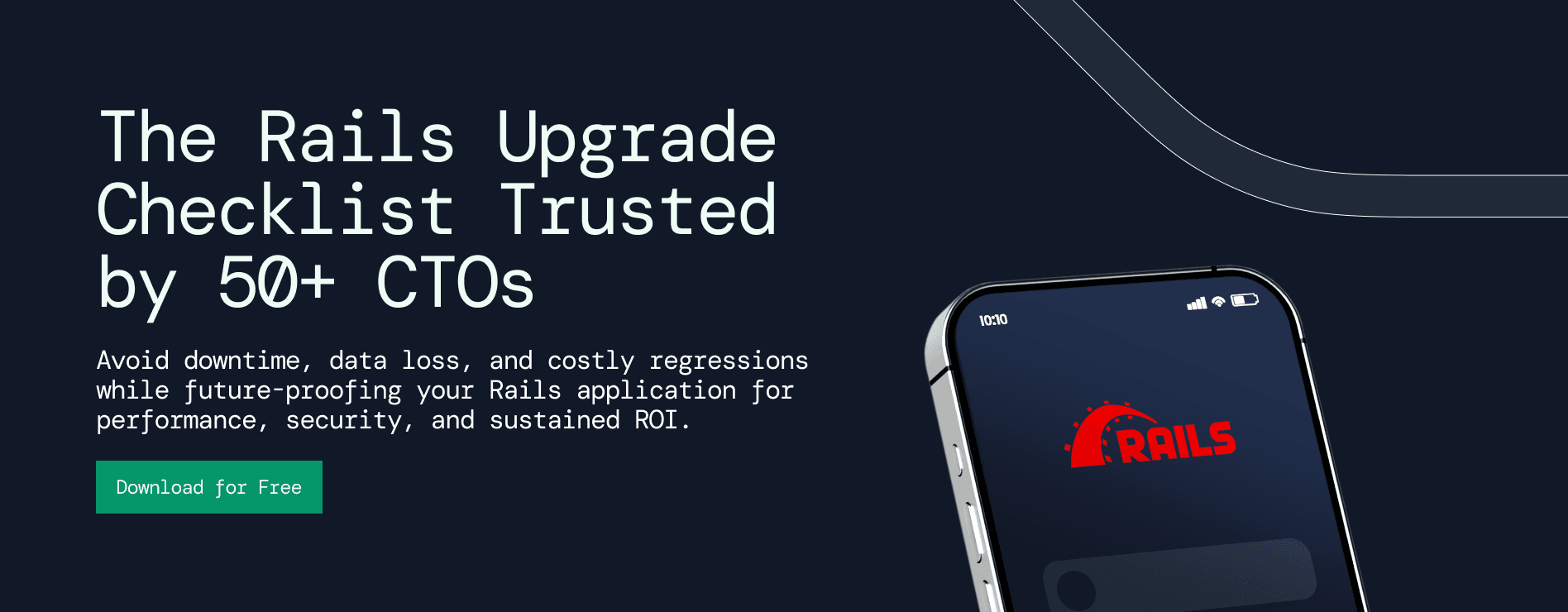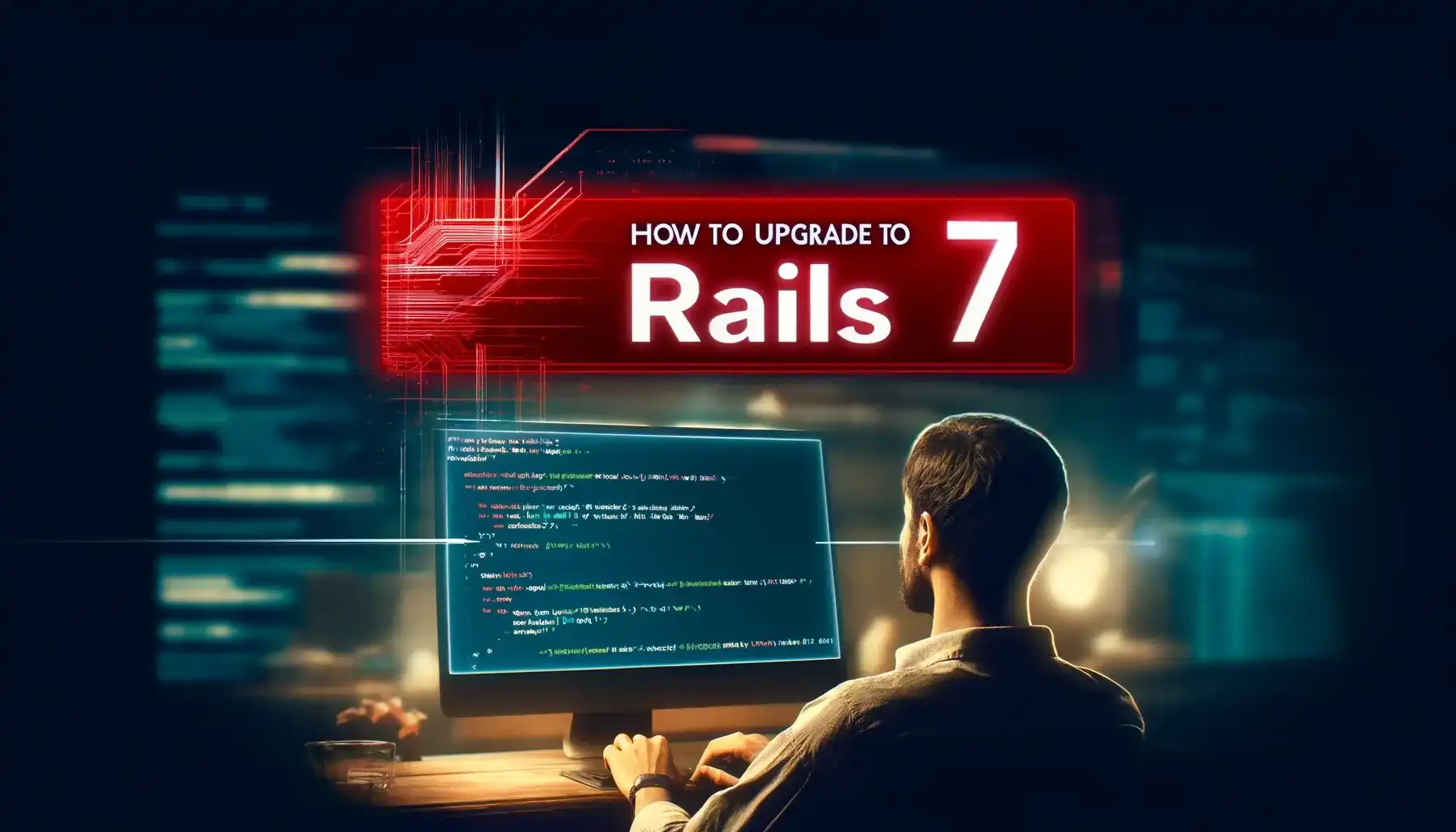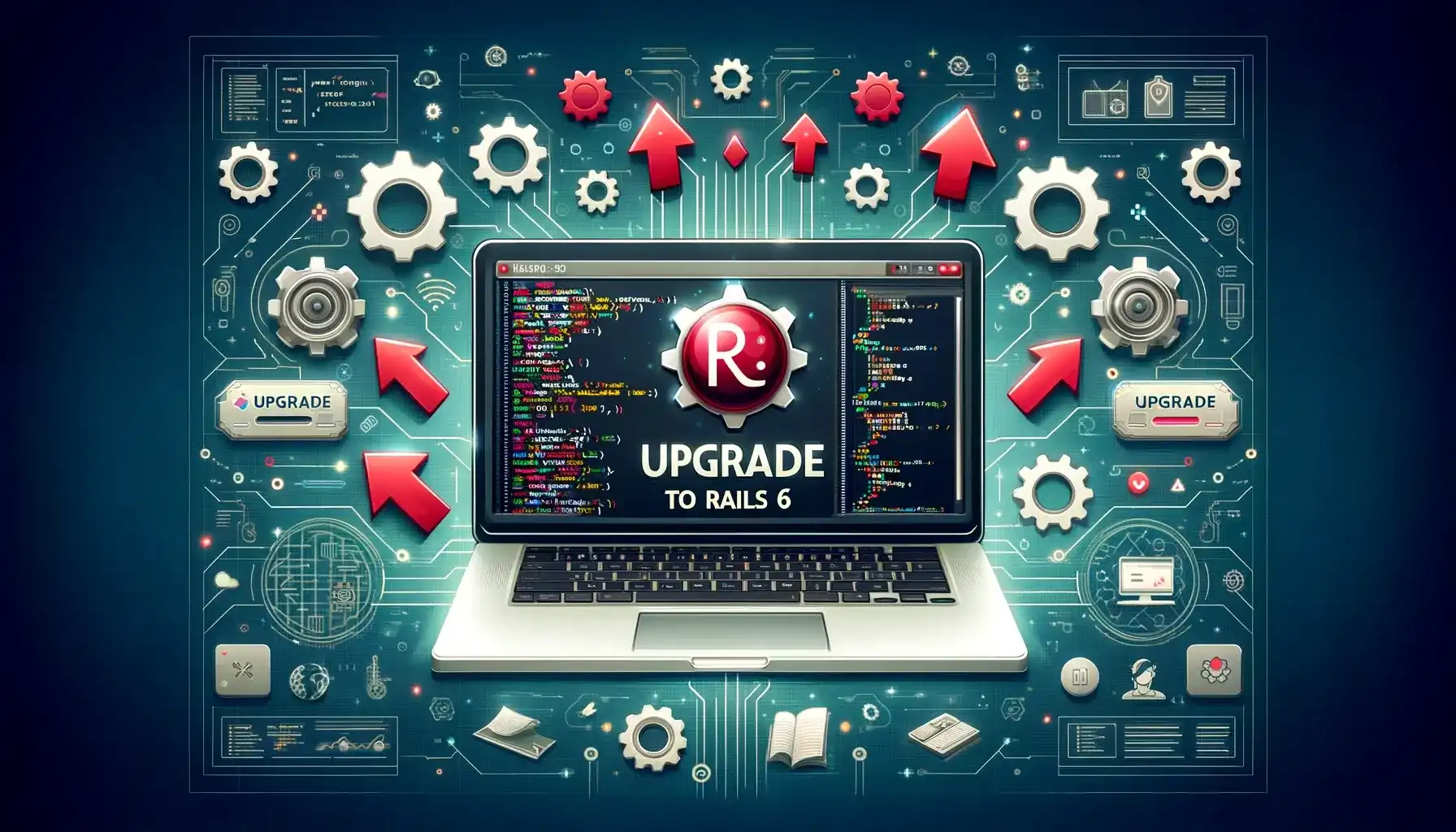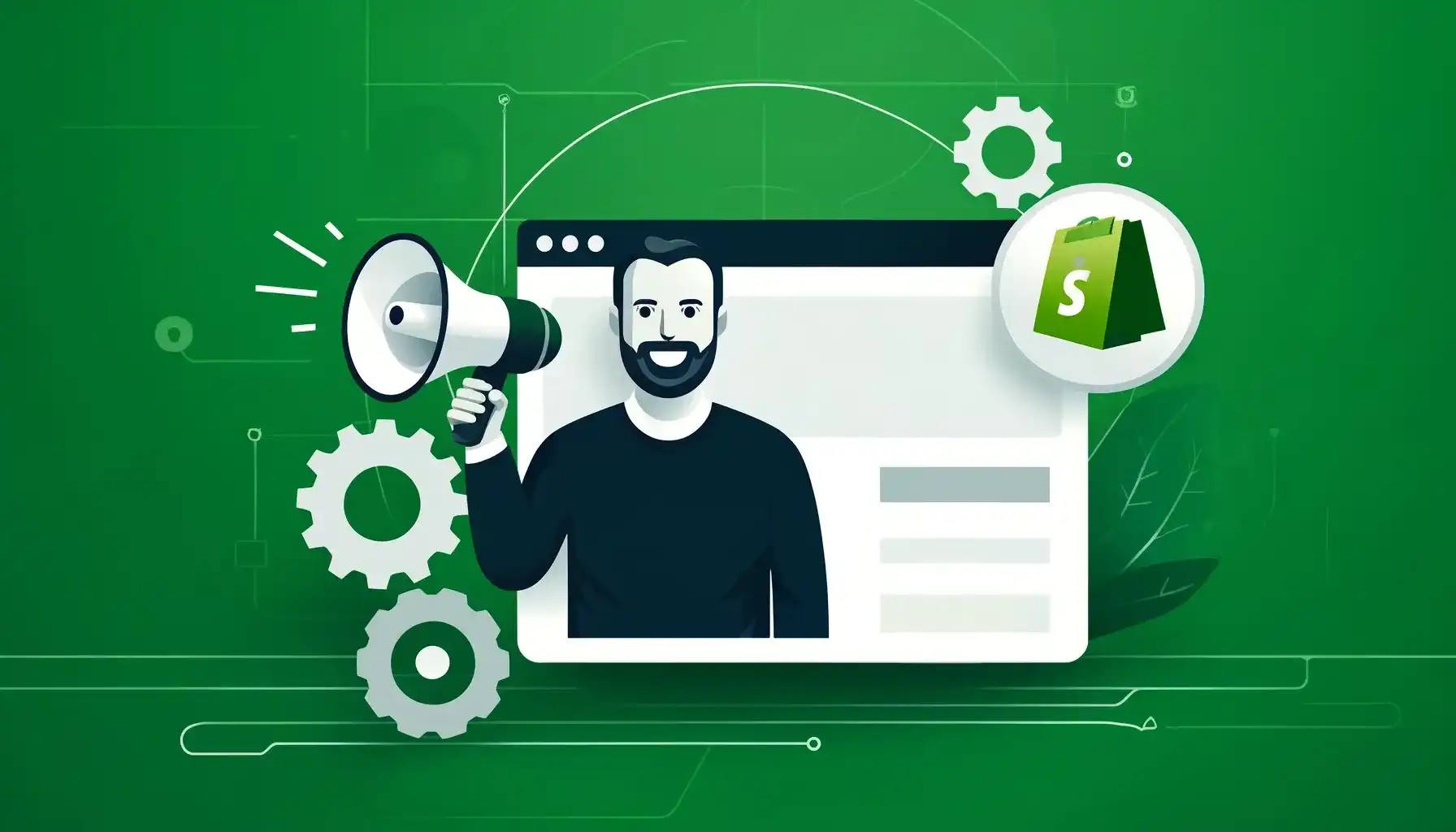Avoid Costly Mistakes: What to Look for When Outsourcing Your Rails Upgrade Partner

RailsFactory
Marketing
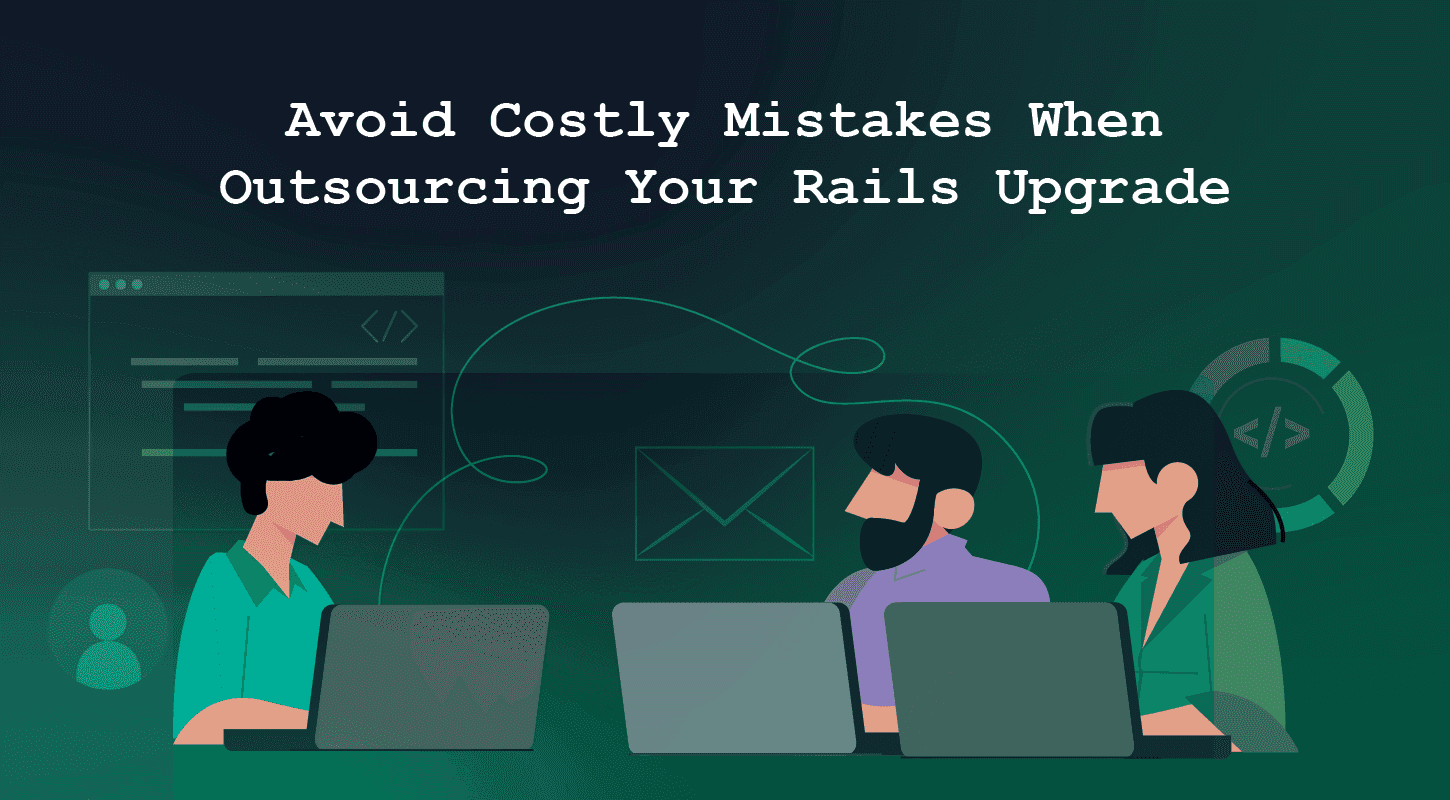
Ruby on Rails framework is dead in 2024.
The decline of Ruby on Rails is undeniable.
You could’ve probably heard these rumors. But the reality tells a different story. Ruby on Rails does not just exist but is advancing with every upgrade.
And that is exactly what brings us here.
If your application is running on Ruby on Rails, you must have already been thinking about upgrading it. As security support and bug fixes are narrowing down for older Rails versions, it is indeed a wise decision to plan ahead.
If you're considering a Rails upgrade service to modernize your app, and contemplating working with a dedicated Rails outsourcing team, you’re in the right place!
Who else can you learn better outsourcing tips from than a company that has done 50 plus upgrade projects successfully and been providing various Ruby on Rails-based services for 16+ years?
Whether you are a startup or an enterprise, Railsfactory has a wide range of experienced Rails developers to upgrade your Rails applications securely and successfully.
Keep reading to know about the list of key criteria for outsourcing a Rails upgrade partner or contact us today to discuss your requirements!
The Impact of Ruby on Rails Outsourcing Mistakes and Why Your Rails Partner Matters
While the ruby on rails upgrade provide numerous benefits from security enhancements to performance improvements, it is a matter of big bucks when it comes to outsourcing to a rails partner. Upgrading a Rails application is a hard nut to crack whether handling it in-house or outsourcing to an external partner. It is indispensable for business and tech leaders to make informed decisions when choosing the right partner for an upgrade. The poor choices will leave you with a broken system, erode the very value you sought from the upgrade, and lead to various challenges as follows:
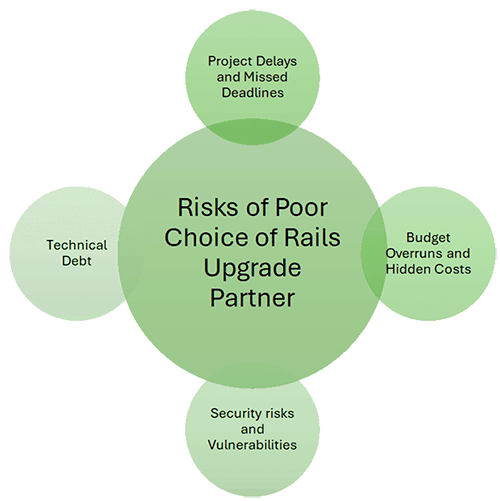
1. Project Delays and Missed Deadlines
Rails is one of the largest codebases. Its upgrade involves various dependencies, third-party integrations, legacy code refactorization and so much more. If your upgrade partner does not have sufficient technical or management expertise in handling upgrade projects, unexpected issues, delays, and missed deadlines are guaranteed.
The missed deadlines are not just about disrupting daily operations but delaying product releases and ROI, frustrating stakeholders and disturbing the entire business bottom line. Therefore, it is essential to spend quality time researching the right partner to ensure timely execution and smooth upgrade of your Rails application.
2. Budget Overruns and Hidden Cost
Why do many businesses postpone Rails upgrades? The reason? It is a protracted and tedious process. It can cause unexpected issues and disrupt work routines. Beyond all this, businesses need to spend big bucks on Rails upgrades. When the budget is already limited, it must be daunting to take a step towards spending for an upgrade.
Irrespective of the economic situation of the business, you foresee the long-term consequences of the outdated version, the benefits of an upgrade and prioritize to go for it. At this point in time, if you rely solely on your senses and choose the partner for their lowball quotes without deep analysis, then this leap is to regret. Here is why.
What if the vendor’s only intention is to secure the project so that they quote a low price and seal the deal? What if the vendor team is not capable enough to either grasp the project’s scope or decipher the precise amount of time, effort, and resources required? The result? Unexpected expenses will balloon beyond the original budget and leave your organization scrambling to manage rising costs.
3. Security risks and vulnerabilities
“Statistics show that the data security industry is expected to reach $68.29 billion by 2029.”
With the boom of the digital world, the demand for data security is souring. Enhancing the security of business and customer data stands to be the primary reason most organizations opt for an upgrade. Ruby on Rails, known for its robust framework, addresses every known security vulnerability—from cross-site scripting (XSS) to SQL injection and other critical exploits—with every new release
One of our US-based clients, a provider of sales software for HVAC dealers and distributors, was running their application on Rails 4, which had 34 vulnerabilities in its Docker image. By upgrading to Rails 7, we transformed their security landscape, reducing those vulnerabilities to just two low-level risks. It, in turn, drastically enhanced the client application’s security.
That said, if the upgrade is mishandled, it can also bring new vulnerabilities into your system. If your upgrade partner's team lacks the necessary skills to implement secure coding practices, leverage security-focused gems, and follow best practices, it will easily leave your application vulnerable to data breaches and security risks, creating severe operational and financial risks.
4. Technical Debt from Shortcuts or Incomplete Upgrades
While attempting to meet deadlines or reduce costs, an inexperienced Rails upgrade partner might instruct developers to take shortcuts. It can either be using temporary solutions, cutting corners in testing, or leaving behind messy code or unresolved bugs.
Although it seems like a temporary relief, this poorly executed upgrade contributes to technical debt and is more likely to increase the complexity of future upgrades and feature development, slow down your entire development cycle and performance, and increase the overall maintenance cost over the period.
Simply put, speed and budget are of the essence when it comes to outsourcing your rails upgrade partner. However, there are a few other crucial aspects one must consider for ensuring the success of an overall upgrade. Failing to evaluate them will lead your business to compromise performance and to run into long-term maintenance burdens that far outweigh initial savings.
The Top 7 Factors to Consider When You Outsource Rails Upgrade Services
While learning from your own experiences is one thing, learning from others' mistakes and experiences is where real wisdom lies. At Railsfactory, we developed around 850 Ruby on Rails applications for our clients across various industries. Along the way, we learnt so much, not just from our own experiences but also from the challenges our clients faced before partnering with us. From scope creep to bottlenecks, we have seen it all. Now it is your turn to learn from our experience.
Careful evaluation of an upgrade partner goes beyond just budget—it is more about minimizing future risks, avoiding expensive outsourcing mistakes, and setting your business applications up for long-term success. With our extensive experience in the world of Ruby on Rails, here we have compiled a list of factors that a business must not overlook to join hands with the right partner for the success of their Ruby on Rails upgrade.
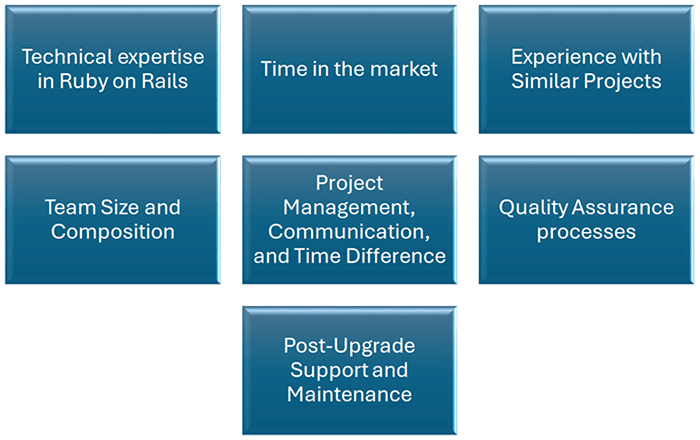
1.Technical expertise in Ruby on Rails
Outsourcing an upgrade partner is a smart decision but not a seemingly simple one to make. Boarding a bus is easy. But boarding a bus that is going to the intended destination with skilled drivers can only land you at the right place and time. See, you nod your head!
Before venturing out for an upgrade, it would be prudent to have an in-depth grasp of the functionalities and complexities of your application. The reason is that every version can introduce different challenges based on your codebase, dependencies, and overall system architecture. Thus, you need to evaluate if the outsourcing team has the deep technical expertise to understand the nuances of Rails upgrades from deprecated methods to version-specific quirks. This ensures that you will not just switch your applications to a new one but also root for improving your application's maintainability and performance at the end of the process and beyond.
2. Time in the market
The longevity of a partner in the Ruby on Rails ecosystem is a critical indicator of holding precise knowledge and capacities. More years equals more challenges, which must have equipped them to address complexities during upgrades proactively.
So always look for a team that has a strong portfolio with success stories. Moreover, such an upgrade partner is likely to have refined workflows and well-tested solutions handy to ensure a smooth transition. Partnering with them will reduce risks and prepare your business for emerging opportunities.
3. Experience with Similar Projects
Why would you hire a contractor who only has experience building skyscrapers when a simple kitchen remodel is needed? The point is not all the Rails applications, and their requirements are the same. The rails upgrade service provider experienced only with large-scale enterprise applications might not be the suitable one for your business.
Hence, it is imperative to find a partner with a team that has direct experience with upgrading applications in your industry or with similar functionality. So that they can comprehend the nuances, anticipate domain-specific challenges (compliance issues, data migrations, performance optimization, etc.), and handle the criticalities during upgrades efficiently.
4.Team Size and Composition
The team size and composition not only play a vital role in achieving the overall objectives and effectiveness of the upgrade, but they also shape the way they operate. A good Rails upgrade partner must have a team with the right mix of senior developers and midlevel engineers to look after complex tasks and routine coding tasks, respectively.
Besides, based on project complexity, scale, and the expected deadline, you must also inspect the number of team members involved in the project. It is apparent that a small team can neither meet closer deadlines nor have the bandwidth to face unexpected challenges. Thus, ensuring that sufficient team members are involved in the project is essential to speed up the upgrade and meet your key objectives around it.
5. Project Management, Communication, and Time Difference
One of the key variables that determine the positive collaboration between your in-house team and the team of an outsourcing company is effective project management. An experienced upgrade partner will follow organized methodologies for clear communication of regular status updates, progress reports, and for managing any escalation of issues. It contributes significantly to keeping your in-house team and upgrade partner on the same page, reducing the risk of communications gaps, scope creep, and budget overruns.
Furthermore, the time zone difference between the in-house and partner teams can directly affect the efficacy of the work, as it is more likely to cause communication delays. Thus, it is wise to team up with a partner who can offer overlapped work hours for a few team members. It will help you stay informed about progress and unexpected challenges, allowing you to raise concerns accordingly.
6. Quality Assurance processes
The more complex your Rails app is, the greater the chances of unexpected defects while debugging. Thus, investing your time in analyzing the vendor QA team’s proficiency with Rails upgrade projects and various testing methodologies equates to saving a lot of man-hours and unnecessary stress eventually. Perceiving QAs as just testers is detrimental to any software project, let alone the upgrade project.
As upgrading Rails brings changes in core functionalities, libraries, or dependencies, without thorough QA, there is always a risk of performance degradation and security vulnerabilities. Therefore, it is undeniably necessary to check if your upgrade partner integrates QA into every phase of the upgrade process and ensure that your application will remain stable and perform optimally long after the upgrade is over.
7.Post-Upgrade Support and Maintenance
A successful Ruby on Rails upgrade should not end with deployment. To err is human, so even after thorough testing, unforeseen bugs can emerge at any time after the upgrade in real-world conditions.
For added security, we, at the Railsfactory, even suggest our client’s internal team re-validate all our testing results at their end at the final stage of the upgrade.
So, the key here is, to always look for an upgrade partner that can offer post-upgrade support to address any immediate issues to ensure your application remains secure, reliable, and scalable.
A step further, if your partner can offer ongoing maintenance services, they will keep a close eye on application performance, security patches, dependency management, and so much more. It will not only help you resolve issues quickly but also ensure your business operations run smoothly and position your application for future upgrades and new feature rollouts, setting the ground ready for long-term success and growth.
Experience a Smooth Rails Upgrade with Railsfactory!
As every upgrade project knocks at our door, we focus beyond future-proofing our clients’ applications. Our team strives for ways to simplify the decision-making for businesses considering Ruby on Rails upgrades and has recently built a tool called Rails Upgradation Calculator.
It can help your in-house team evaluate Rails version compatibility for migration seamlessly, amping up the decision-making on the Rails upgrade.
Whether your product needs a fresh upgrade or is amid an ongoing upgrade or requires full-stack RoR expertise, we’ve got you covered.
As a trusted Ruby outsourcing company, we can serve as your dedicated RoR partner, providing expert support through a skilled Rails outsourcing team.
After you approach us, we’ll take you through a quick discovery phase, where we will thoroughly analyze your application, understand your workflow, and create a customized plan of action with timelines. We are happy to take the complexities of Rails upgrade off your plate in all ways possible!
Still, have many doubts? Feel free to book a 15-minute chat with our team and get ready to upgrade your application with confidence.
